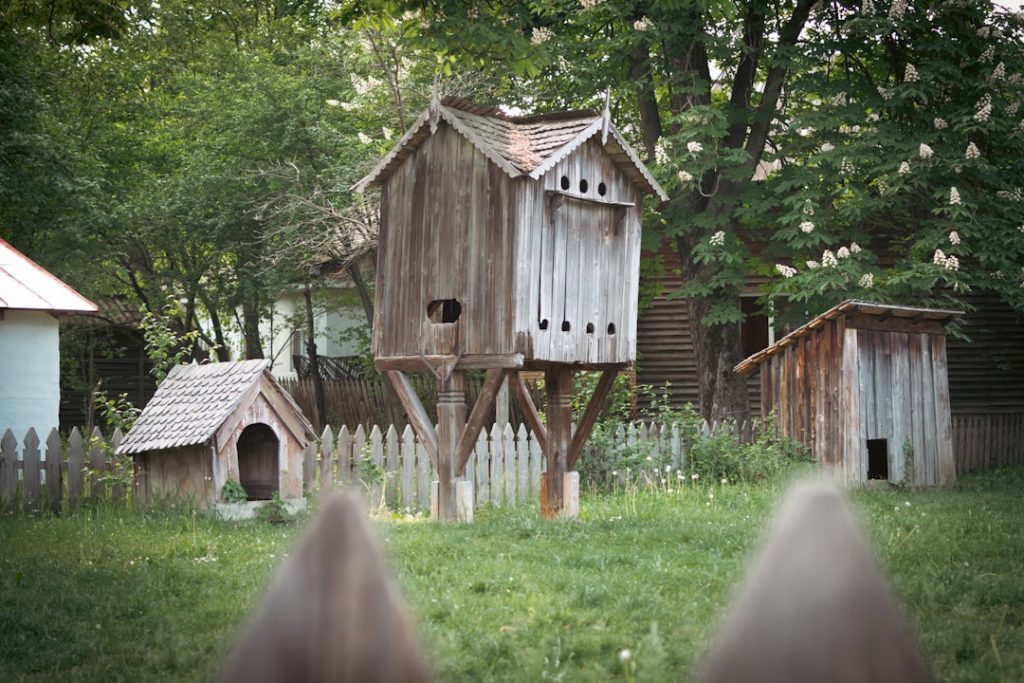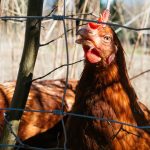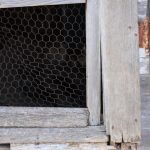Chickens have specific requirements for cold weather survival that must be addressed to ensure their health and well-being. Their lack of insulating feathers and small body size make them particularly vulnerable to low temperatures. Chickens are at risk of frostbite on their combs and wattles, which can be painful and potentially fatal if left untreated.
Cold weather also increases their energy requirements, necessitating potential dietary adjustments during winter months. Proper ventilation in chicken coops is crucial, even in cold weather. While it may seem counterintuitive, adequate airflow prevents moisture buildup, which can lead to respiratory issues and other health problems.
Natural light is also essential for chickens, as it helps regulate their internal clocks and maintain overall health. Coops should be equipped with windows or other sources of natural light to meet this need. Understanding and addressing these specific cold weather requirements allows chicken owners to provide a safe and comfortable environment for their flocks during winter.
This includes implementing appropriate measures to protect against frostbite, adjusting feed as necessary, ensuring proper ventilation, and providing access to natural light.
Table of Contents
- 1 Providing adequate shelter and warmth for chickens
- 2 Ensuring access to fresh water in freezing temperatures
- 3 Adjusting feeding habits for winter conditions
- 4 Protecting chickens from predators in snowy conditions
- 5 Monitoring and addressing health issues in cold weather
- 6 Implementing additional measures for extreme snowfall or blizzards
- 7 FAQs
Key Takeaways
- Chickens need extra energy and warmth in cold weather to maintain their body temperature and stay healthy.
- Provide insulated and draft-free shelter with proper ventilation to protect chickens from cold temperatures.
- Use heated waterers or check water frequently to ensure chickens have access to unfrozen water.
- Increase the amount of high-energy foods like grains and seeds to help chickens stay warm in winter.
- Secure coops and runs with sturdy fencing and consider using motion-activated lights or alarms to deter predators in snowy conditions.
- Monitor chickens for signs of frostbite, respiratory issues, and other cold-related health problems, and provide appropriate care.
- Consider additional measures like snow removal, extra bedding, and emergency heating options for extreme snowfall or blizzards.
Providing adequate shelter and warmth for chickens
Insulating the Chicken Coop
First and foremost, it’s essential to ensure that your chicken coop is well-insulated and free from drafts. This can be achieved by sealing any gaps or cracks in the walls and windows, as well as adding extra insulation if necessary.
Bedding for Comfort and Warmth
Additionally, providing a thick layer of bedding on the coop floor can help to keep your chickens warm and comfortable during the winter months. Straw or wood shavings are both good options for coop bedding, as they provide insulation and help to absorb moisture.
Providing a Heat Source
In addition to a well-insulated coop, it’s crucial to provide your chickens with a heat source to help them stay warm in cold weather. This can be achieved with a heat lamp or a heated roosting bar, both of which can help to prevent frostbite and keep your chickens comfortable during the winter months. It’s important to place the heat source in a safe location where it won’t pose a fire hazard or cause overheating, and to monitor it regularly to ensure that it’s functioning properly.
By providing adequate shelter and warmth for your chickens, you can help them stay healthy and comfortable throughout the winter.
Ensuring access to fresh water in freezing temperatures

One of the biggest challenges of keeping chickens in cold weather is ensuring that they have access to fresh water at all times. In freezing temperatures, waterers can quickly become ice-bound, leaving your chickens without a vital source of hydration. To prevent this from happening, it’s important to invest in a heated waterer that will keep your chickens’ water from freezing.
Heated waterers are available in a variety of sizes and styles, so you can choose the option that best suits the needs of your flock. In addition to using a heated waterer, it’s important to regularly check on your chickens’ water supply throughout the day to ensure that it hasn’t frozen over. If you notice that the water has frozen, it’s important to replace it with fresh, unfrozen water as soon as possible.
You can also add a small amount of apple cider vinegar to your chickens’ water to help prevent it from freezing, as the acidity can lower the freezing point of the water. By taking these measures, you can ensure that your chickens have access to fresh water even in freezing temperatures, helping them stay healthy and hydrated throughout the winter.
Adjusting feeding habits for winter conditions
Feeding your chickens properly is crucial for their health and well-being, especially during the winter months when they require more energy to stay warm. In cold weather, it’s important to provide your chickens with a high-quality layer feed that is specifically formulated for winter conditions. This type of feed typically contains higher levels of protein and fat, which can help your chickens maintain their body temperature and stay healthy during the colder months.
Additionally, you may want to consider supplementing your chickens’ diet with scratch grains or mealworms, which can provide them with extra energy and warmth. It’s also important to monitor your chickens’ food intake during the winter months, as they may eat more than usual in an effort to stay warm. Keep an eye on their body condition and adjust their feed accordingly to ensure that they are getting the nutrients they need without becoming overweight.
Additionally, providing your chickens with access to fresh greens, such as kale or cabbage, can help supplement their diet and provide them with essential vitamins and minerals. By adjusting your feeding habits for winter conditions, you can help ensure that your chickens stay healthy and well-nourished throughout the colder months.
Protecting chickens from predators in snowy conditions
Snowy conditions can pose unique challenges when it comes to protecting your chickens from predators. In winter, food sources may be scarce for wild animals, leading them to become more desperate and aggressive in their search for food. Additionally, snow can provide cover for predators, making it easier for them to approach your coop undetected.
To protect your flock from predators in snowy conditions, it’s important to take extra precautions to secure their coop and run. One effective way to protect your chickens from predators in snowy conditions is by installing hardware cloth around the perimeter of their coop and run. Hardware cloth is a sturdy wire mesh that can help prevent predators from digging under or climbing over fences to access your flock.
Additionally, it’s important to regularly check for signs of predator activity around your property, such as tracks or scat, and take appropriate measures to deter them from approaching your coop. This may include using motion-activated lights or sound deterrents, as well as removing any potential food sources that could attract predators to your property. By taking these precautions, you can help protect your chickens from predators in snowy conditions and keep them safe throughout the winter.
Monitoring and addressing health issues in cold weather

Common Health Issues in Cold Weather
Some common health issues that can arise in cold weather include respiratory infections, frostbite, and vitamin deficiencies. Respiratory infections are particularly prevalent in winter due to poor ventilation and high humidity levels in the coop. Frostbite is another potential health issue, particularly on chickens’ combs and wattles. Vitamin deficiencies can also be a concern when fresh greens are less readily available.
Preventing Respiratory Infections
To prevent respiratory infections, it’s essential to ensure that your chickens’ living environment is clean and well-ventilated. This can be achieved by regularly cleaning the coop, removing soiled bedding, and providing adequate ventilation to reduce humidity levels.
Protecting Against Frostbite and Vitamin Deficiencies
To prevent frostbite, provide your flock with a warm and dry living environment, and consider applying petroleum jelly or another protective ointment to their combs and wattles in extreme cold. Additionally, consider supplementing your chickens’ diet with a vitamin and mineral supplement specifically formulated for poultry to address potential vitamin deficiencies.
By monitoring your flock’s health closely and taking appropriate measures to address any issues that arise, you can help keep your chickens healthy and thriving throughout the winter.
Implementing additional measures for extreme snowfall or blizzards
In some regions, extreme snowfall or blizzards can pose significant challenges for chicken keepers. During these events, it’s important to take additional measures to ensure the safety and well-being of your flock. One key consideration is ensuring that your chickens have access to food and water during extreme snowfall or blizzards.
This may involve clearing a path from the coop to their run or providing them with extra feed and water inside their coop if they are unable to access their usual outdoor areas. It’s also important to regularly check on your chickens during extreme snowfall or blizzards to ensure that they are safe and comfortable. If necessary, you may need to shovel paths or clear snow from their coop roof to prevent collapse.
Additionally, providing extra bedding inside the coop can help keep your chickens warm and dry during extreme weather events. Finally, it’s important to have a plan in place for emergency situations, such as power outages or impassable roads, so that you can continue to care for your flock even during extreme weather conditions. By implementing these additional measures for extreme snowfall or blizzards, you can help ensure that your chickens stay safe and healthy no matter what winter throws their way.
If you’re looking for tips on how to keep chickens alive in the snow, you might also be interested in learning about how to care for goslings. Check out this article for helpful information on raising and nurturing young geese.
FAQs
What are some tips for keeping chickens alive in snow?
Some tips for keeping chickens alive in snow include providing a warm and dry shelter, ensuring access to fresh water that doesn’t freeze, and providing extra food to help them stay warm.
How can I keep my chicken coop warm in the snow?
You can keep your chicken coop warm in the snow by insulating it, using heat lamps or heated pads, and providing plenty of bedding for the chickens to nest in.
What should I feed my chickens in the snow?
In the snow, it’s important to feed your chickens a balanced diet that includes plenty of protein and carbohydrates to help them stay warm. You can also provide extra treats like scratch grains and mealworms to help boost their energy.
How can I prevent my chickens’ water from freezing in the snow?
To prevent your chickens’ water from freezing in the snow, you can use heated waterers, add a small amount of apple cider vinegar to the water to lower its freezing point, or simply change the water frequently to prevent it from freezing.
What are some common health issues for chickens in the snow?
Some common health issues for chickens in the snow include frostbite, respiratory infections, and dehydration. It’s important to monitor your chickens closely and address any health issues promptly.
Meet Walter, the feathered-friend fanatic of Florida! Nestled in the sunshine state, Walter struts through life with his feathered companions, clucking his way to happiness. With a coop that’s fancier than a five-star hotel, he’s the Don Juan of the chicken world. When he’s not teaching his hens to do the cha-cha, you’ll find him in a heated debate with his prized rooster, Sir Clucks-a-Lot. Walter’s poultry passion is no yolk; he’s the sunny-side-up guy you never knew you needed in your flock of friends!







